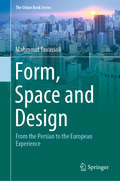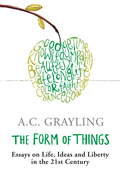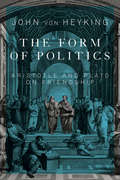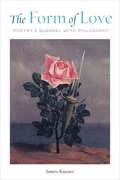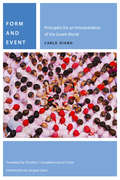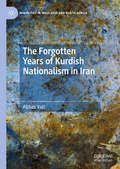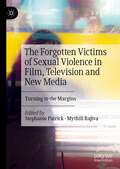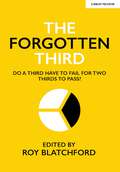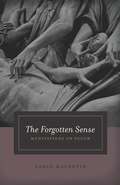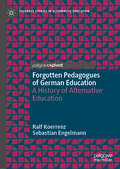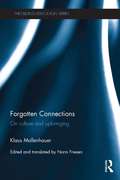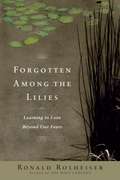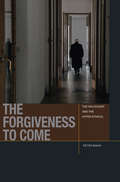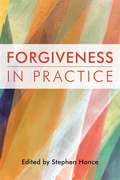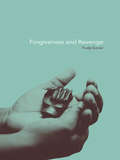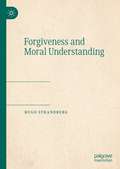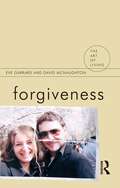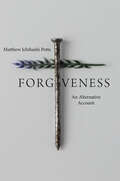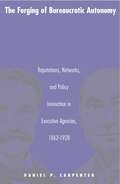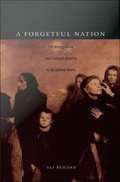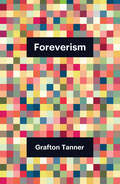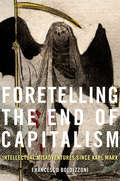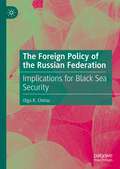- Table View
- List View
Form, Space and Design: From the Persian to the European Experience (The Urban Book Series)
by Mahmoud TavassoliThis book studies the principles of urban spatial organization of historic cities. It can be considered a guide to design, presenting qualitative criteria to satisfy practical needs. The subject is explored through interconnected chapters, each addressing an important aspect of form-space and design values, knowledge and our present problems. In this book the interpretation is artistic and socio-cultural. Discussion is not concentrated on singular urban space but on interrelated spaces and elements across the city, and complexes. Considering the comparative aspects of study, the reader will notice that despite cultural differences, there is a common understanding in artistic creativity and sensibility in the presented examples.
The Form of Things: Essays on Life, Ideas and Liberty
by A. C. GraylingThe bestseller from our pre-eminent philosopher, A.C. Grayling'Grief and loneliness, depression, despair and failure - those things are the common human lot at least at times in all our lives'. Yet it is philosophy which, while not providing an answer to these problems, can enable us to prepare for them, and create strategies with which to deal with them. It is only through reflecting upon the world around us, reading, thinking, questioning, enjoying, that we can inculcate understanding, tolerance and importantly the courage to live our lives. It is our responsibility to live such 'considered lives' and to realise that we are authors of a narrative that can be shaped and controlled.This is the fifth in a series of essay miscellanies from our foremost philosopher A.C. Grayling, reflecting upon the form of our world and its multiplicity. The essays are grouped by theme into reflections upon life and the standards we live by, including vivid polemics and perceptive pieces on significant thinkers, contemporary rights and liberties issues. This book brilliantly articulates the philosophical debate and reflection that is needed to prepare us for life in the twenty-first century.
The Form of Things: Essays on Life, Ideas and Liberty
by Prof A.C. GraylingThe bestseller from our pre-eminent philosopher, A.C. Grayling'Grief and loneliness, depression, despair and failure - those things are the common human lot at least at times in all our lives'. Yet it is philosophy which, while not providing an answer to these problems, can enable us to prepare for them, and create strategies with which to deal with them. It is only through reflecting upon the world around us, reading, thinking, questioning, enjoying, that we can inculcate understanding, tolerance and importantly the courage to live our lives. It is our responsibility to live such 'considered lives' and to realise that we are authors of a narrative that can be shaped and controlled.This is the fifth in a series of essay miscellanies from our foremost philosopher A.C. Grayling, reflecting upon the form of our world and its multiplicity. The essays are grouped by theme into reflections upon life and the standards we live by, including vivid polemics and perceptive pieces on significant thinkers, contemporary rights and liberties issues. This book brilliantly articulates the philosophical debate and reflection that is needed to prepare us for life in the twenty-first century.
Form of Politics: Aristotle and Plato on Friendship
by John Von HeykingFor statesmen, friendship is the lingua franca of politics. Considering the connections between personal and political friendship, John von Heyking's The Form of Politics interprets the texts of Plato and Aristotle and emphasizes the role that friendship has in enduring philosophical and contemporary political contexts. Beginning with a discussion on virtue-friendship, described by Aristotle and Plato as an agreement on what qualifies as the pursuit of good, The Form of Politics demonstrates that virtue and political friendship form a paradoxical relationship in which political friendships need to be nourished by virtue-friendships that transcend the moral and intellectual horizons of the political society. Von Heyking then examines Aristotle's ethical and political writings - which are set within the boundaries of political life - and Plato's dialogues on friendship in Lysis and the Laws, which characterize political friendship as festivity. Ultimately, arguing that friendship is the high point of a virtuous political life, von Heyking presents a fresh interpretation of Aristotle and Plato's political thought, and a new take on the most essential goals in politics. Inviting reassessment of the relationship between friendship and politics by returning to the origins of Western philosophy, The Form of Politics is a lucid work on the foundations of political cooperation.
Form of Politics: Aristotle and Plato on Friendship (McGill-Queen's Studies in the History of Ideas #66)
by John von HeykingFor statesmen, friendship is the lingua franca of politics. Considering the connections between personal and political friendship, John von Heyking’s The Form of Politics interprets the texts of Plato and Aristotle and emphasizes the role that friendship has in enduring philosophical and contemporary political contexts. Beginning with a discussion on virtue-friendship, described by Aristotle and Plato as an agreement on what qualifies as the pursuit of good, The Form of Politics demonstrates that virtue and political friendship form a paradoxical relationship in which political friendships need to be nourished by virtue-friendships that transcend the moral and intellectual horizons of the political society. Von Heyking then examines Aristotle’s ethical and political writings – which are set within the boundaries of political life – and Plato’s dialogues on friendship in Lysis and the Laws, which characterize political friendship as festivity. Ultimately, arguing that friendship is the high point of a virtuous political life, von Heyking presents a fresh interpretation of Aristotle and Plato’s political thought, and a new take on the most essential goals in politics. Inviting reassessment of the relationship between friendship and politics by returning to the origins of Western philosophy, The Form of Politics is a lucid work on the foundations of political cooperation.
The Form of Love: Poetry’s Quarrel with Philosophy
by James KuznerCan poetry articulate something about love that philosophy cannot? The Form of Love argues that it can. In close readings of seven “metaphysical” poems, the book shows how poets of the early modern period and beyond use poetic form to turn philosophy to other ends, in order not to represent the truth about love but to create a virtual experience of love, in all its guises. The Form of Love shows how verse creates love that can’t exist without poetry’s specific affordances, and how poems can, in their impossibility, prompt love’s radical re-imagining. Like the philosophies on which they draw, metaphysical poems imagine love as an intense form of non-sovereignty, of giving up control. They even imagine love as a liberating bondage—to a friend, a beloved, a saint, a God, or a garden. Yet these poems create strange, striking versions of such love, made in, rather than through, the devices, structures, and forces where love appears.Tracing how poems think, Kuzner argues, requires an intimate form of reading: close—even too close—attention to and thinking with the text. Showing how poetry thinks of love otherwise than other fields, the book reveals how poetry and philosophy can nevertheless enter into a relation that is itself like love.
Form and Event: Principles for an Interpretation of the Greek World (Commonalities)
by Carlo DianoCarlo Diano’s Form and Event has long been known in Europe as a major work not only for classical studies but even more for contemporary philosophy. Already available in Italian, French, Spanish, and Greek, it appears here in English for the first time, with a substantial Introduction by Jacques Lezra that situates the book in the genealogy of modern political philosophy.Form and Event reads the two classical categories of its title phenomenologically across Aristotle, the Stoics, and especially Homer. By aligning Achilles with form and Odysseus with event, Diano links event to embodied and situated subjective experience that simultaneously finds its expression in a form that objectifies that experience. Form and event do not exist other than as abstractions for Diano but they do come together in an intermingling that Diano refers to as the “eventic form.” On Diano’s reading, eventic forms interweave subjectively situated and embodied experiences, observable in all domains of human and nonhuman life.A stunning interpretation of Greek antiquity that continues to resonate since its publication in 1952, Form and Event anticipates the work of such French and Italian post-war thinkers as Gilles Deleuze, Alain Badiou, Roberto Esposito, and Giorgio Agamben.
The Forgotten Years of Kurdish Nationalism in Iran (Minorities in West Asia and North Africa)
by Abbas ValiThis book investigates the forgotten years of Kurdish nationalism in Iran, from the fall of the Kurdish republic to the advent of the Iranian revolution. An original and path-breaking investigation of the period, it sheds light not only on the historical specificity of the phenomenon of nationalism in exile, but also on the political processes and practices defining the development of Kurdish nationalism in the post-revolutionary era. Although nationalist landmarks such as the Kurdish republic in 1946 and the resurgence of the movement in the revolutionary conjuncture of 1978-79 have attracted the attention of historians and social scientists in recent years, little is known about the three decades of Kurdish nationalism in exile between these two events. This analysis draws on contemporary poststructuralist theory to question the concept of the minority in democratic and constitutional theory, arguing that it is an effect of the discursive linkage between sovereign power and the dominant ethnic-linguistic identity in the nation-state. This text will appeal to a wide academic audience ranging from the fields of Kurdish, Iranian and Middle East Studies to ethnicity, nationalism, government, and political science.
The Forgotten Victims of Sexual Violence in Film, Television and New Media: Turning to the Margins
by Stephanie Patrick Mythili RajivaThis edited collection provides an intersectional and transnational exploration of representations of sexual violence and rape within films, television shows, and digital media in the contemporary context of the #MeToo and #TimesUp movements. Drawing upon sociology, gender studies, cultural studies, media studies, and Black feminist studies, chapters focus on women and texts at the margins of mainstream culture’s depictions of sexual violence. The editors and contributors examine the dominant narrative of the thin, cisgender, heterosexual white female victim, and the ways in which social and cultural conversations around race and gender impact and are impacted by depictions of sexual violence in media. This book will be of interest to scholars and students in sociology, gender studies, and media studies, particularly those interested in the intersectionality of race and gender.Chapter 1 is available open access under a Creative Commons Attribution 4.0 International License via link.springer.com.
The Forgotten Third: Do One Third Have To Fail For Two Thirds To Succeed?
by Roy Blatchford'The Forgotten Third' is a provocative collection of essays which poses the fundamental question: 'Do a third of school students have to fail so that two-thirds can pass?'Roy Blatchford has brought together a group of leading thinkers and influencers in UK education to address this question - and pose some answers.Featuring contributions from: Caroline Barlow, Geoff Barton, Rebecca Boomer-Clark, Peter Collins, Tim Coulson, Kiran Gill, Miranda Green, Peter Hyman, David Laws, Rachel Macfarlane, Rupert Moreton, Harmer Parr, Marc Rowland, Catherine Sezen, Richard Sheriff, Nic Taylor-Mullins and Iain Veitch.'The Forgotten Third' challenges orthodoxies to shape a 'levelled up' education system.
The Forgotten Sense: Meditations on Touch
by Pablo MauretteOf all the senses, touch is the most ineffable—and the most neglected in Western culture, all but ignored by philosophers and artists over millennia. Yet it is also the sense that links us most intimately to the world around us, from our mother’s caress when we’re born to the gentle lowering of our eyelids after death. The Forgotten Sense gives touch its due, addressing it in multifarious ways through a series of six essays. Literary in feel, ambitious in conception, admirable in their range of reference and insight, these meditations address questions fundamental to the understanding of touch: What do we mean when we say that an artwork touches us? How does language affect our understanding of touch? Is the skin the deepest part of the human body? Can we philosophize about a kiss? To aid him in answering these questions, Pablo Maurette recruits an impressive roster of cultural figures from throughout history: Homer, Lucretius, Chrétien de Troyes, Melville, Sir Thomas Browne, Knausgaard, Michel Henry and many others help him unfurl the underestimated importance of the sense of touch and tactile experience. The resulting book is essay writing at its best—exploratory, surprising, dazzling, a reading experience like no other. You will come away from it with a new appreciation of touch, and a new way of understanding our interactions with the world around us.
Forgotten Pedagogues of German Education: A History of Alternative Education (Palgrave Studies in Alternative Education)
by Ralf Koerrenz Sebastian EngelmannThis book introduces six pedagogues from the German context to an English-speaking audience, and demonstrates their significant contribution to the field of alternative education. First and foremost, the authors emphasise the importance of understanding the history of education, to realise that in fact what we understand as ‘normal’ today is by no means the only course history could have taken. The quest for alternative ways of schooling goes back to the late eighteenth century, where educational thinkers advocated various approaches in the face of rapid societal change. The chosen six thinkers are not well known in the English-speaking scientific community, and some are even infrequently cited in the German context. In offering an historic and systematic introduction to concepts that can frame Alternative Education in different ways, this book allows the reader to critically reevaluate present forms of education by using the past as a mirror.
Forgotten Connections: On culture and upbringing (Theorizing Education)
by Klaus MollenhauerKlaus Mollenhauer’s Forgotten Connections: On Culture and Upbringing is internationally regarded as one of the most important German contributions to educational and curriculum theory in the 20th century. Appearing here in English for the first time, the book draws on Mollenhauer’s concern for social justice and his profound awareness of the pedagogical tension between the inheritance of the past and the promise of the future. The book focuses on the idea of Bildung, in which philosophy and education come together to see upbringing and maturation as being much more about holistic experience than skill development. This translation includes a detailed introduction from Norm Friesen, the book’s translator and editor. This introduction contextualizes the original publication and discusses its application to education today. Although Mollenhauer’s work focused on content and culture, particularly from a German perspective, this book draws on philosophy and sociology to offer internationally relevant responses to the challenge of communicating cultural values and understandings to new generations. Forgotten Connections will be of value to students, researchers and practitioners working in the fields of education and culture, curriculum studies, and in educational and social foundations.
Forgotten Among the Lilies: Learning to Love Beyond Our Fears
by Ronald RolheiserThe author of The Holy Longing explores the debilitating obsessions that often dominate our lives and offers down-to-earth guidance for learning to leave our fears, anxieties, and guilt "forgotten among the lilies." "Rarely do we taste the food we eat or the coffee we drink. Instead we go through our days too preoccupied, too compulsive, and too dissatisfied to really be able to be present for and celebrate our own lives," Ronald Rolheiser writes in the introduction to this powerful collection of essays...
The Forgiveness to Come: The Holocaust and the Hyper-Ethical
by Peter BankiThis book is concerned with the aporias, or impasses, of forgiveness, especially in relation to the legacy of the crimes against humanity perpetrated by the Nazis and their collaborators during World War II. Banki argues that, while forgiveness of the Holocaust is and will remain impossible, we cannot rest upon that impossibility. Rather, the impossibility of forgiveness must be thought in another way. In an epoch of “worldwidization,” we may not be able simply to escape the violence of scenes and rhetoric that repeatedly portray apology, reconciliation, and forgiveness as accomplishable acts. Accompanied by Jacques Derrida’s thought of forgiveness of the unforgivable, and its elaboration in relation to crimes against humanity, the book undertakes close readings of literary, philosophical, and cinematic texts by Simon Wiesenthal, Jean Améry, Vladimir Jankélévitch, Robert Antelme and Eva Mozes Kor. These texts contend with the idea that the crimes of the Nazis are inexpiable, that they lie beyond any possible atonement or repair. Banki argues that the juridical concept of crimes against humanity calls for a thought of forgiveness—one that would not imply closure of the infinite wounds of the past. How could such a forgiveness be thought or dreamed? Banki shows that if today we cannot simply escape the “worldwidization” of forgiveness, then it is necessary to rethink what forgiveness is, the conditions under which it supposedly takes place, and especially its relation to justice.
Forgiveness in Practice
by Stephen Hance Howard Cooper Anthony Bash Reza Shah-Kazemi Vajragupta Gwen Adshead Jesse Butler Meadows Stephen Cherry Deborah Bowman Marian Liebmann Robin Shohet Christiane Sanderson Honor Rhodes Amanda Boorman Steve Nolan Richard Carter Graham Spencer Lord Alderdice Marina Cantacuzino Chris Cook Wendy Dossett Liz GullifordForgiveness has often viewed as a religious obligation but is increasingly being advocated as a means of healing, release and promoting wellbeing. Forgiveness is variously viewed as a duty, virtue or cure, but when it comes to practising forgiveness in real life we find it is always caught up in the complexity of the situation. This book shines a light on how we tend to think about forgiveness in practice, including examples from social work, family therapy, chaplaincy and criminal justice.The book contains many different perspectives on how we think about forgiveness, including overviews of four major religions and reflections from those working in the healing professions. Without advocating a particular approach this book raises important questions around self-forgiveness and forgiving institutions and encourages the reader to think again about forgiveness and how it impacts, challenges and transforms relationships.
Forgiveness and Revenge
by Trudy GovierForgiveness and Revenge is a powerful exploration of our attitudes to serious wrongdoings and a careful examination of the values that underlie our thinking about revenge and forgiveness.From adulterous spouses to terrorist factions, we are surrounded by wrongdoing, yet we rarely agree which response is appropriate. The problem of how to respond realistically and sensitively to the wrongs of the past remains a perplexing one. Trudy Govier clarifies our thinking on this subject by examining the moral and practical impact of revenge and forgiveness, both personal and political.Forgiveness and Revenge offers much-needed clarity and reason where emotions often prevail. It is essential reading for anyone interested in the ethics of attitudes to wrongdoing.
Forgiveness and Moral Understanding
by Hugo StrandbergThis book sets out to deepen our moral understanding by thinking about forgiveness: what does it mean for our understanding of morality that there is such a thing as forgiveness? Forgiveness is a challenge to moral philosophy, for forgiveness challenges us: it calls me to understand my relations to others, and thereby myself, in a new way. Without arguing for or against forgiveness, the present study tries to describe these challenges. These challenges concern both forgiving and asking for forgiveness. The latter is especially important in this context: what does the need to be forgiven mean? In the light of such questions, central issues in the philosophy of forgiveness are critically discussed, about the reasons and conditions for forgiveness, but mostly the focus is on new questions, about the relation of forgiveness to plurality, virtue, death, the processes of moral change and development, and the possibility of feeling at home in the world.
Forgiveness (The Art of Living)
by Eve Garrard David McNaughtonForgiveness usually gets a very good press in our culture: we are deluged with self-help books and television shows all delivering the same message, that forgiveness is good for everyone, and is always the right thing to do. But those who have suffered seriously at the hands of others often and rightly feel that this boosterism about forgiveness is glib and facile. Perhaps forgiveness is not always desirable, especially where the wrongdoing is terrible or the wrongdoer unrepentant. In this book, Garrard and McNaughton suggest that the whole debate suffers from a crippling lack of clarity about what forgiveness really amounts to. They argue that it is more difficult, complex and troubling than many of its advocates suppose. Nevertheless, they conclude, a proper understanding of forgiveness allows us to avoid cheap and shallow forms of it, and enables us to see why it is right and admirable to forgive even unrepentant wrongdoers.
Forgiveness: An Alternative Account
by Matthew Ichihashi PottsA deeply researched and poignant reflection on the practice of forgiveness in an unforgiving world Matthew Ichihashi Potts explores the complex moral terrain of forgiveness, which he claims has too often served as a salve to the conscience of power rather than as an instrument of healing or justice. Though forgiveness is often linked with reconciliation or the abatement of anger, Potts resists these associations, asserting instead that forgiveness is simply the refusal of retaliatory violence through practices of penitence and grief. It is an act of mourning irrevocable wrong, of refusing the false promises of violent redemption, and of living in and with the losses we cannot recover. Drawing on novels by Kazuo Ishiguro, Marilynne Robinson, Louise Erdrich, and Toni Morrison, and on texts from the early Christian to the postmodern, Potts diagnoses the real dangers of forgiveness yet insists upon its enduring promise. Sensitive to the twenty-first-century realities of economic inequality, colonial devastation, and racial strife, and considering the role of forgiveness in the New Testament, the Christian tradition, philosophy, and contemporary literature, this book heralds the arrival of a new and creative theological voice.
The Forging of Bureaucratic Autonomy: Reputations, Networks, and Policy Innovation in Executive Agencies, 1862-1928 (Princeton Studies in American Politics: Historical, International, and Comparative Perspectives #173)
by Daniel CarpenterUntil now political scientists have devoted little attention to the origins of American bureaucracy and the relationship between bureaucratic and interest group politics. In this pioneering book, Daniel Carpenter contributes to our understanding of institutions by presenting a unified study of bureaucratic autonomy in democratic regimes. He focuses on the emergence of bureaucratic policy innovation in the United States during the Progressive Era, asking why the Post Office Department and the Department of Agriculture became politically independent authors of new policy and why the Interior Department did not. To explain these developments, Carpenter offers a new theory of bureaucratic autonomy grounded in organization theory, rational choice models, and network concepts. According to the author, bureaucracies with unique goals achieve autonomy when their middle-level officials establish reputations among diverse coalitions for effectively providing unique services. These coalitions enable agencies to resist political control and make it costly for politicians to ignore the agencies' ideas. Carpenter assesses his argument through a highly innovative combination of historical narratives, statistical analyses, counterfactuals, and carefully structured policy comparisons. Along the way, he reinterprets the rise of national food and drug regulation, Comstockery and the Progressive anti-vice movement, the emergence of American conservation policy, the ascent of the farm lobby, the creation of postal savings banks and free rural mail delivery, and even the congressional Cannon Revolt of 1910.
A Forgetful Nation: On Immigration and Cultural Identity in the United States
by Ali BehdadIn A Forgetful Nation, the renowned postcolonialism scholar Ali Behdad turns his attention to the United States. Offering a timely critique of immigration and nationalism, Behdad takes on an idea central to American national mythology: that the United States is "a nation of immigrants," welcoming and generous to foreigners. He argues that Americans' treatment of immigrants and foreigners has long fluctuated between hospitality and hostility, and that this deep-seated ambivalence is fundamental to the construction of national identity. Building on the insights of Freud, Nietzsche, Foucault, and Derrida, he develops a theory of the historical amnesia that enables the United States to disavow a past and present built on the exclusion of others. Behdad shows how political, cultural, and legal texts have articulated American anxiety about immigration from the Federalist period to the present day. He reads texts both well-known--J. Hector St. John de Crvecoeur's Letters from an American Farmer, Alexis de Tocqueville's Democracy in America, and Walt Whitman's Leaves of Grass--and lesser-known--such as the writings of nineteenth-century nativists and of public health officials at Ellis Island. In the process, he highlights what is obscured by narratives and texts celebrating the United States as an open-armed haven for everyone: the country's violent beginnings, including its conquest of Native Americans, brutal exploitation of enslaved Africans, and colonialist annexation of French and Mexican territories; a recurring and fierce strand of nativism; the need for a docile labor force; and the harsh discipline meted out to immigrant "aliens" today, particularly along the Mexican border.
Foreverism (Theory Redux)
by Grafton TannerWhat do cinematic “universes,” cloud archiving, and voice cloning have in common? They’re in the business of foreverizing – the process of revitalizing things that have degraded, failed, or disappeared so that they can remain active in the present. To foreverize something is to reanimate it, to enclose and protect it from time and the elements, and to eradicate the feeling of nostalgia that accompanies loss. Foreverizing is a bulwark against instability, but it isn’t an infallible enterprise. That which is promised to last forever often does not, and that which is disposed of can sometimes last, disturbingly, forever. In this groundbreaking book, American philosopher Grafton Tanner develops his theory of foreverism: an anti-nostalgic discourse that promises growth without change and life without loss. Engaging with pressing issues from the ecological impact of data storage to the rise of reboot culture, Tanner tracks the implications of a society averse to nostalgia and reveals the new weapons we have for eliminating it.
Foretelling the End of Capitalism: Intellectual Misadventures since Karl Marx
by Francesco BoldizzoniIntellectuals since the Industrial Revolution have been obsessed with whether, when, and why capitalism will collapse. This riveting account of two centuries of failed forecasts of doom reveals the key to capitalism’s durability. Prophecies about the end of capitalism are as old as capitalism itself. None have come true. Yet, whether out of hope or fear, we keep looking for harbingers of doom. In Foretelling the End of Capitalism, Francesco Boldizzoni gets to the root of the human need to imagine a different and better world and offers a compelling solution to the puzzle of why capitalism has been able to survive so many shocks and setbacks. Capitalism entered the twenty-first century triumphant, its communist rival consigned to the past. But the Great Recession and worsening inequality have undermined faith in its stability and revived questions about its long-term prospects. Is capitalism on its way out? If so, what might replace it? And if it does endure, how will it cope with future social and environmental crises and the inevitable costs of creative destruction? Boldizzoni shows that these and other questions have stood at the heart of much analysis and speculation from the early socialists and Karl Marx to the Occupy Movement. Capitalism has survived predictions of its demise not, as many think, because of its economic efficiency or any intrinsic virtues of markets but because it is ingrained in the hierarchical and individualistic structure of modern Western societies. Foretelling the End of Capitalism takes us on a fascinating journey through two centuries of unfulfilled prophecies. An intellectual tour de force and a plea for political action, it will change our understanding of the economic system that determines the fabric of our lives.
The Foreign Policy of the Russian Federation: Implications for Black Sea Security
by Olga R. ChiriacThis distinctive book deconstructs the foundational elements of Russian foreign policy from a Russian perspective and with references to Russian sources, rather than the typical Western perspective. The author Olga Raluca Chiriac situates her work at the intersection of strategic studies and cognitive psychology, offering an analysis that goes deep into the roots of Russian strategic behavior, especially socio-cultural elements such as attitudes towards the West, language, culture. She highlights Russia’s unique decision-making process, sometimes overt and other times covert. The book aims to present a mechanism for analysis in both strategic choices and foreign policy, but it also points out that countries and nations are complicated entities, all having a particular historical experience, generational trauma, culture and traditions.
